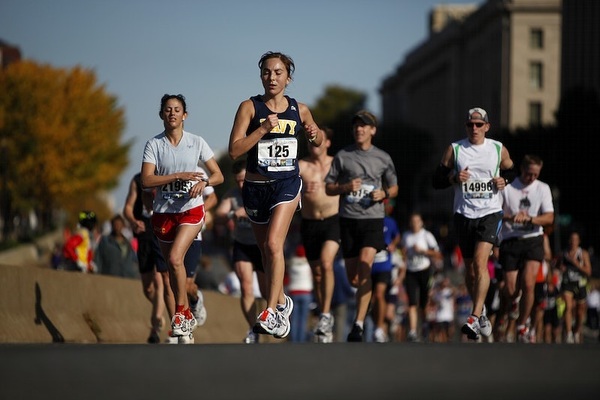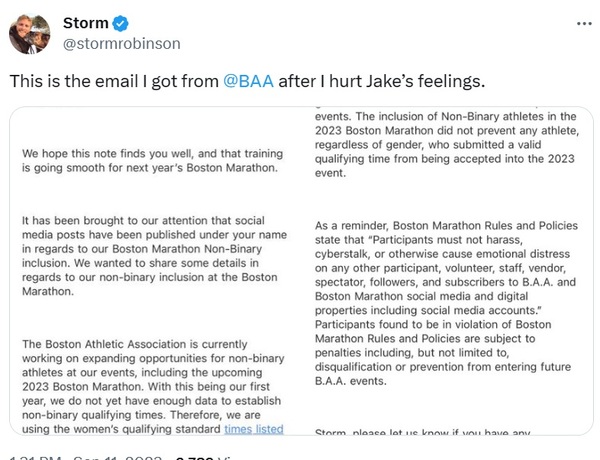
(function(d, s, id) { var js, fjs = d.getElementsByTagName(s)[0]; if (d.getElementById(id)) return; js = d.createElement(s); js.id = id; js.src = “https://connect.facebook.net/en_US/sdk.js#xfbml=1&version=v3.0”; fjs.parentNode.insertBefore(js, fjs); }(document, ‘script’, ‘facebook-jssdk’)); –>
–>
October 4, 2023
Sports’ acquiescence to gender ideology pits men against men, when it’s not pitting men against women. No, men are not being knocked off podiums or national teams because of transgender athletes. We don’t and won’t have our own Riley Gaines.
‘); googletag.cmd.push(function () { googletag.display(‘div-gpt-ad-1609268089992-0’); }); document.write(”); googletag.cmd.push(function() { googletag.pubads().addEventListener(‘slotRenderEnded’, function(event) { if (event.slot.getSlotElementId() == “div-hre-Americanthinker—New-3028”) { googletag.display(“div-hre-Americanthinker—New-3028”); } }); }); }
But separate categories and prize money for non-binary athletes, like the New York Road Runners and Boston Athletics Association offer, undermine men who fit a certain profile. Men who are not the fastest, but are well faster than most people; and who maintain their basic levels of honesty, integrity, and sportsmanship.
New York Road Runners produces the New York City Marathon and dozens of other races each year. Last year, they expanded their prize purses to pay equal amounts to the top 5-8 men, women, and non-binary NYRR members in their races.
In every race, the top runner in the non-binary division (always a male) finished behind the top runner in the men’s division. Several times, the top female bested the fastest non-binary. Yet all three — top male, top female, top non-binary — received the same amount. At every race, the non-binary “winner” took home more money than faster men and, sometimes, faster women.
‘); googletag.cmd.push(function () { googletag.display(‘div-gpt-ad-1609270365559-0’); }); document.write(”); googletag.cmd.push(function() { googletag.pubads().addEventListener(‘slotRenderEnded’, function(event) { if (event.slot.getSlotElementId() == “div-hre-Americanthinker—New-3035”) { googletag.display(“div-hre-Americanthinker—New-3035”); } }); }); }
Behind the top 1-2 non-binary runners, the performance curve drops precipitously. Third-place prize money in 13 races ranged from $300 – $750. The average overall finish of the third-place non-binary runner was 451st.
By comparison, the average overall finish of the third-place woman was 43rd.
Had any one of 30 runners switched his NYRR registration from “M” to “X” at the beginning of 2022, he’d have made over $3000 from these races. A handful of other faster-than-me-and-probably-you mid-grade male runners could have pocketed $500 or more by clicking non-binary in his NYRR profile.
Of those 30, only 10 won any prize money running in the men’s division. A few earned about half as much as they could have garnered as non-binary. Others, though, could have ratcheted up their winnings 10x or more — a difference of $10,000 for one runner — had they traded their M for X.
The Boston Marathon requires entrants to run a minimum age- and sex-graded time during a qualifying window for each year’s race, making a Boston Qualifier time (BQ), an annual goal for some runners and a lifetime goal for many more. Many more hopefuls run BQs than there are available spots in the race. A BQ grants you the chance to register, with no guarantee of getting in.
That makes the non-binary standards doubly easy.
‘); googletag.cmd.push(function () { googletag.display(‘div-gpt-ad-1609268078422-0’); }); document.write(”); googletag.cmd.push(function() { googletag.pubads().addEventListener(‘slotRenderEnded’, function(event) { if (event.slot.getSlotElementId() == “div-hre-Americanthinker—New-3027”) { googletag.display(“div-hre-Americanthinker—New-3027”); } }); }); } if (publir_show_ads) { document.write(“
The non-binary qualifying times are the same as the women’s: 30 minutes slower than the men in each age group. If you’re a man struggling to shave a few minutes — or a half hour — off of your marathon time so you can run Boston, you can either hire a coach and train harder and smarter; or you can run a qualifying race as a non-binary and basically get a 30-minute head start.
Maybe you’ve run a BQ, but only just. The BAA’s qualification policy states “those who are the fastest among the pool of applicants in their age and  gender group will be accepted.” A marginal time as a man translates into a 30-minute cushion as a non-binary, so the chance of getting in with a given time significantly improves.
gender group will be accepted.” A marginal time as a man translates into a 30-minute cushion as a non-binary, so the chance of getting in with a given time significantly improves.
But that’s probably moot. Entries for the Boston Marathon are allocated by age and gender group. The BAA does not publicize the number of entries in each group. But because the BAA is “actively working on expanding opportunities for non-binary athletes at our events, including the Boston Marathon,” they probably overallocate non-binary slots.
The non-binary category, therefore, tilts the competition in a zero-sum game against the men.
The BAA protects non-binary applicants and participants in another way. Many runners make a big deal on social media when they run a BQ. But rarely does the Boston Athletics Association take notice of, let alone send a personalized email to, a qualifier based on something they tweet.
Unless he speaks up about road running’s embrace of gender ideology.
Storm Robinson had a BQ in 2022 when he tweeted critically about the non-binary category and an activist who has been leading the non-binary charge in road running. A few days later:

Robinson has a tougher stomach than I do: he read that activist’s “Guide to Non-Binary Inclusion in Running.” We’ll have to ask him if the chapter on PR/comms includes “Nice BQ you got there. Be a shame if anything happened to it.”
Finally, advocates say that non-binary prize money is purely additive, that it comes at no expense to the money-winning men and women nor to the men’s and women’s prize purses.
These perspectives sidestep the concepts of the seen vs. unseen, the fungibility of money, and inflation.
By increasing the overall prize purse, race management is deciding not to spend that money on something that could benefit more runners. By increasing the prize purse via a non-binary category, race management is deciding not to increase the depth of prizes for the men and women nor the value of each place for the men and women. The top athletes are losing out on what they could be earning because the race management decided to reward mediocre times via an athletically irrelevant category. Just as turning up the money printer decreases the value of the dollars in your wallet, inflating the prize purse via the non-binary category decreases the value of being amongst the top men and women in the race.
In this respect, the detriment suffered by the top men in the race is the same as that suffered by the women.
The non-binary category in sports depends on us ignoring the bait-and-switch between sex and gender. It’s ironic, then, that all the talk about creating “inclusion” and “opportunity” across genders has resulted in inclusion and opportunity across the sexes.
Men are now included with women among the victims of gender ideology in sport, giving men and women the opportunity to work together to reclaim fairness, merit, competitiveness, and integrity.
George M. Perry is a sports performance coach, sports businessman, and writer.
Image: RawPixel.com
<!–
–>
<!– if(page_width_onload <= 479) { document.write("
“); googletag.cmd.push(function() { googletag.display(‘div-gpt-ad-1345489840937-4’); }); } –> If you experience technical problems, please write to [email protected]
FOLLOW US ON
<!–
–>
<!– _qoptions={ qacct:”p-9bKF-NgTuSFM6″ }; ![]() –> <!—-> <!– var addthis_share = { email_template: “new_template” } –>
–> <!—-> <!– var addthis_share = { email_template: “new_template” } –>





